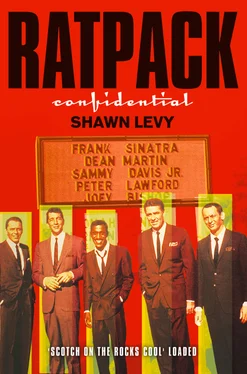1 ...8 9 10 12 13 14 ...19 Not long into the production, with the town dressed up for the film’s climactic carnival scene, Minnelli was taking, Frank thought, an inordinate amount of time setting up a shot. The director circled around the camera several times, sizing up various angles; he closed his eyes and fell into deep concentration; around him, extras made merry with the free rides and snacks, and his principal actors stood waiting for direction. MacLaine could feel Frank tightening up. Finally, Minnelli came to a solution to whatever was troubling him. He turned to his crew: “Move the Ferris wheel!”
That did it. Frank left the set, left the town, left the whole state. They found him at home in L.A., adamant that he would put up with not one whit more of artsy-fartsy bullshit. Sol Siegel, the budget ticking away, made Minnelli promise to compromise the purity of his vision for the sake of getting the damn film made.
They finally did it—only 10 percent over budget. When the picture finally came out, to so-so reviews and big box office, MacLaine got her first Academy Award nomination (Minnelli, ironically, swept the Oscars with his other film of the year, Gigi ), and Frank walked away with at least a half million.
But Dean might’ve made out best of all: Not only did he prove that The Young Lions was no fluke, that he really could pull off a dramatic part, but he had a new best-friendship, sealed in booze, broads, gambling, and Italian food. Some Came Running premiered in January 1959; that same month, Frank served as conductor for Dean’s album Sleep Warm , and the two of them screwed around together for the first time on the stage at the Sands. It was almost like the Martin and Lewis days all over again.
If Frank and Dean shared a natural kinship, it was also a curious one. Their talents were so disparate: Frank manly and passionate and artistic; Dean flippant and lazy, and, well, a little fruity.
Take Bama: Amid all this hot-blooded James Jones hooey, with Frank boozing and writing and chasing tail and being chased by it, there’s Dean listlessly bridging a deck of cards in his hands, talking in a hokey cornpone accent, fussing about his wardrobe, tsking at the world and the way Frank’s character reacts to it. Sure he gets a couple of broads as the thing unfolds, but they’re nonentities compared to the full-blooded chicks Frank’s involved with; even though Bama’s girls are made to seem promiscuous, you don’t imagine that he actually screws them—and certainly not that he does any of the hard work if he does.
Same with Sleep Warm. Dean always did queerer material than Frank in the studio: novelty records, Italian-language numbers, country-western songs. Dean’s approach was always practically a lampoon, but it was a lampoon of masculinity and the troubadour pretensions of performers like Frank as much as it was of showbiz and the fact that he was actually getting paid so much to do something so easy.
Listen to the effeminate little spin he gives his sibilants on numbers like “All I Do Is Dream of You” and “Sleepytime Gal.” Jerry liked to do all that nance shit onstage—the critics gave him hell for it—but Dean put it to another use: He wasn’t parodying a gay man, he was parodying a straight man. He sounded at least as contemptuous of his beloved as solicitous.
It was a con: Sicilian Frank strove and suffered and made art; Abruzzese Dean chuckled a little bit to himself and did what he had to do to keep the whole shuck-and-jive afloat. If Frank wanted to conduct, produce movies, and host big events, he just had to tell Dean when and where and he’d be there—so long as he wasn’t expected to bring anything with him or stick around after to clean up.
He had had Jerry already. If Frank wanted him as a brother, fine, but it would be on Dean’s terms.
For someone who would take orders, Frank could always count on Sammy.
Sammy Davis Jr. was the kind of guy about whom God seemed not to have been able to make up his mind. On the face of things, by his own reckoning, he had more strikes against him than you could count—he was short, maimed, ugly, black, Jewish, gaudy, uneducated. But he could do anything: song, dance, pantomime, impressions, jokes, and even, in a manner of speaking, drama. He overcame so much that his merely being there among them was an epochal triumph: He was the Jackie Robinson of showbiz.
And yet when he saw himself in a mirror he was disgusted: “I gotta get bigger,” he’d implore himself. “I gotta get better.”
He was so used to being excluded that he was willing to kill himself with work to be let in. He’d suffer all manner of indignities: Frank’s clumsy racial jokes; years of Jim Crow treatment in theaters, hotels, and restaurants; the nigger-baiting of high-rolling southerners in Vegas casinos; a patently bogus marriage to a black dancer intended to quiet journalists about his taste for white girls; the explicit disdain of mobsters and other bosses. But he kept at it, convinced that sheer will and talent would stop the world saying no.
Who was he trying to impress? His mother, a showgirl, was a cipher in his life, a ghost whose approval he never seems to have missed; his father, a small-time song-and-dance man, he eclipsed when still a boy. All the know-it-alls, naysayers, and bigots who’d ever discouraged him he’d silenced with sheer talent, guts, and drive. The gods themselves nodded with pleasure upon him: “This kid’s the greatest entertainer,” declared Groucho Marx at Hollywood’s Jewish mecca of leisure, the Hillcrest Country Club, one afternoon, “and this goes for you, too, Jolson” (to which Jolie merely responded with a smile). He was not only the first black man through the door but one of the all-time greats, regardless of origin.
Yet he felt hollow: All the money and fame and sex and sycophants in the world still couldn’t squelch the nagging inner sense that he was a nothing —and that if he could only rouse a little more out of himself, he could finally be a something. He sang that he was “133 pounds of confidence,” that he was “Gonna Build a Mountain,” that he had “a lot of livin’ to do,” and he sounded like he meant it. But each garish boast gave off a vibe of whistling past a graveyard; in his heart of hearts, he could never vanquish the sense that all the work he’d done to get so far could be snuffed out by a mere wave of Fate’s lordly white hand.
Sammy was the baby of the Rat Pack, born four days before Frank’s tenth birthday, and that banal fact—more than race, size, taste, line of work, personal habits, common friends, political leanings, money, sex, or power—was the single governing factor in their relationship. Frank was always the big brother allowing the kid, Sammy, to hang out with the older guys; Sammy was always the precocious little brat tugging feverishly at his idol’s sleeve. Neither had actual siblings, but they filled those roles for each other: Frank needed to be the patron as much as Sammy needed to be patronized. Everything about their mutual solicitude, affection, and trust, every aspect of their difference and of their symbiosis, lay in germ form in the simple age difference between them.
Uniquely among his peers in Frank’s circle, Sammy was a showbiz brat. His mom, Puerto Rican-born Elvera “Baby” Sanchez, was so committed to her career as a chorus girl that she worked until two weeks before her child arrived; as soon as she was able to return to the stage, she left the kid with relatives in Brooklyn and hit the road along with Sammy Sr., who was the lead male dancer in Will Mastin’s vaudeville act.
After that, there was barely a whiff of Elvera in her son’s life. She and Big Sam split for good not long after their son was born, which might have made Sammy’s story another “deprived baby beats the world to win his mama’s love” yarn but for the fact that Big Sam and Mastin, with the approval of Sammy’s extremely protective grandma, Rosa Davis, took the boy on the road with them from the time he was three and provided him with as big and loving a family as most children ever have. Chorus girls, singers, comics, and musicians were his society; dressing rooms, boarding-houses, and buses his playgrounds. He never attended so much as a day of kindergarten in his life—Big Sam and Mastin hid him from child welfare authorities by gluing whiskers on him and billing him as a midget—but he was steeped in a showbiz curriculum virtually from birth.
Читать дальше












